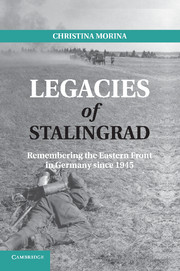IntroductionWar, Politics, and the Study of Memory
Published online by Cambridge University Press: 07 October 2011
Summary
War was the central theme of Germany’s twentieth century. The first half of the century saw unprecedented violence and destruction caused successively by the Kaiserreich and the Third Reich. The second half was shaped by the consequences of these wars and the realities of a resulting cold war: total defeat, utter devastation, a divided nation under Allied occupation, and a second dictatorship on German soil. Studying modern German history thus entails dealing with war and its social, political, and cultural consequences along with the narratives and memories it inspired in its aftermath. The two most terrible, closely intertwined crimes committed by Germans during World War II – the Holocaust and the war against the Soviet Union – gave rise to two diametrically opposed official memories of the Nazi past in the two postwar Germanys. Although the mass murder of about 6 million Jews would gain the most prominent position in West German public memory of the war, official memory in East Germany centered around the Nazi attack on the Soviet Union. This fundamental difference derived to a great extent, but not exclusively, from the political realities and ideological antagonism of the Cold War – the West German alliance with the West and the integration of East Germany into the Soviet sphere of influence. A multitude of personal, political, and ideological motives of those postwar politicians who came to dominate the political landscape in divided Germany also gave shape to this fundamental difference.
The emergence of the differing – what I call – political memories of the Nazi war against the Soviet Union – henceforth also referred to as the war on the Eastern Front or, simply, the Eastern Front – in divided and reunited Germany is the subject of this book. I present a comparative study that examines when and how the war was discussed in public, with a particular focus on the two social groups that often dominated the collective memory landscape: the political elite and war veterans. I investigate the relationship between public memory and politics by asking how memory formed and informed political culture, and vice versa. I am thus concerned with the “public use of history,” with the recollection, appropriation, and narration of the war against the Soviet Union by politicians, state officials, and war veterans in the context of the most important domestic and foreign policy debates in postwar German history.
- Type
- Chapter
- Information
- Legacies of StalingradRemembering the Eastern Front in Germany since 1945, pp. 1 - 17Publisher: Cambridge University PressPrint publication year: 2011



